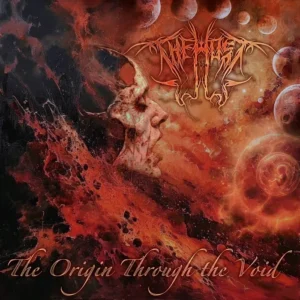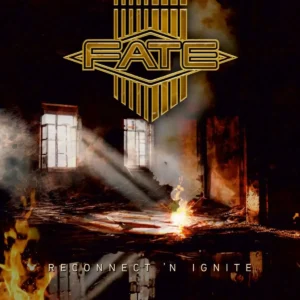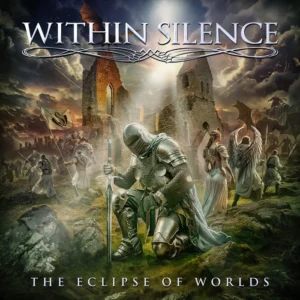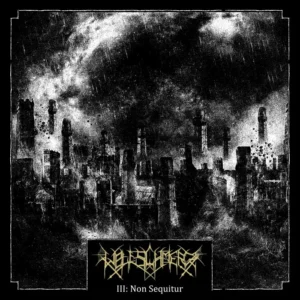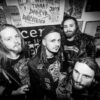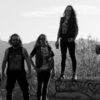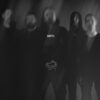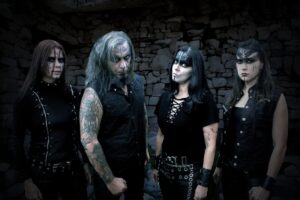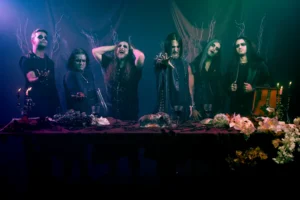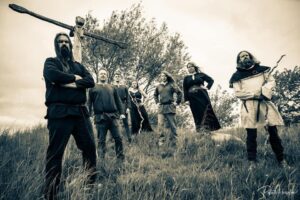The Entire Band
City Of God
•
November 18, 2005
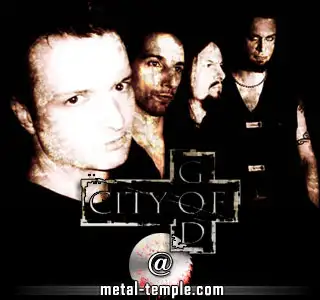
Simon: Mark had some great guitar parts ready for what was going to be a final Kill II This album but basically the lineup of K2T had disintegrated leaving Mark [Mynett - guitars] as the sole member again. Mark and Jeff [Singer - drums] decided to get together and work out some song arrangements and then Mark gave me a call and asked if I'd be interested in putting some vocal tracks down. Mark and I have been good mates for years so I was more than happy to get involved.
At this point we hadn't given any consideration to much except to get some good music together so I guess we all just assumed we'd call it Kill II This. As it turns out I had some vocal melody and lyric ideas that fitted where Mark had none, and vice versa so everything came together very quickly albeit with a different sound to K2T. We had a chat and decided we didn't want this to be just another lineup change in what seemed to be a band blighted by them. We just needed a bass player. Again we've all known Tim [Preston - bass] for a long time and we all get on with him really well so when he told us he'd be interested in playing bass for us it was an easy decision to make. And that was it: new band, lineup complete, album recorded.
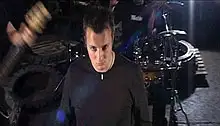
You have a new album, A New Spiritual Mountain, all set to be released soon. How long did the whole writing/recording process take?
Jeff: Writing began around January 2004 when Mark and I decided we would like to collaborate on a new Kill 2 This album. Mark had a lot of great ideas. When we worked on the arrangements together everything seemed to happen relatively quickly and with the songs being stripped down and back to basics there just seemed to be a new dimension added which was not really in the same ball park as where Kill 2 This had been, a shift of genre as such. It was clear that this should be a different project. We finished writing and had pre production done by May and recorded the drums mid May 2004.
Simon: Vocal parts were written probably around September/October 2004 but only took a week or two to write and record. The rest was Mark adding guitar parts and mixing etc.
Mark: Yeah, I suppose there was some pressure, but I was very conscious that although I wanted to get the production standard to a high level, I didn't want the album sounding like a 'generic' Metal production and it had a different tone and feel to the sound.
Jeff: Like any job, you need to learn the ropes and we have all been incredibly lucky learning, through experience, what is needed at this level in terms of commitment and performance. The hardest thing in a band is being objective, being able to stand back and see what the project needs and to have a vision of where things need to go. In the early COG days both Mark and I were able to bounce ideas back and forth to see what was best overall.
Simon: I think it's also helped us from the point of view of being patient and not jumping at the first deal that's offered to us. We've been quite considered in our approach on this album and I think we've got more control for ourselves because of that.
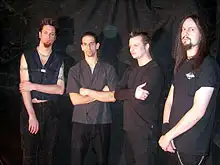
I understand that the album was completed very early on in the year, as far back as January in fact. Has the delay in release been a source of frustration for the band?
Jeff: It is frustrating but it would have been too easy to just throw the album away. We have been burnt too many times by companies that don't follow up promises and are not interested in pushing the band when the signature is on the dotted line. The deal and distribution had to be the best available.
Jeff: I was a full time member in Blaze for three years. It is only Paradise Lost that works as a long term session. Being part of COG is like coming back to the family which was like my time in Kill II This where Mark and I worked incredibly closely together. Things will never be the same as that period as everyone moves on but the creative juices just exploded when we got things back together...things just felt great!
Mark: Sorry to give a brief answer, but in a nutshell yes, I believe that the album would have generated a lot more interest if it had been a new band for people to get excited about.
Jeff: Press has never interested me that much as it is the fans that matter. I would trust the opinion of a fan, positive or negative, any day over someone who is governed by word count to justify their overpaid position.
Jeff: Rock and Metal is always there. Just sounds and images change. We just concentrated on trying to write good songs instead of trying to sound like the next fad or current trend.
Simon: A New Spiritual Mountain is the sort of album that you get more out of the more you listen to it. Some of the stuff that's come out over that last few years has been a bit generic (with some notable exceptions). I've listened to albums and really liked it on first listen (ticks all the boxes: Heavy riffs, gruff vocals, catchy chorus etc.), but then never listened to it again after the second or third listen because it's a bit one dimensional. I think we've ignored any trends and just come up with something we want to listen to that will hold our interest.
Jeff: Completely. These areas are untapped sources of complete passion and dedication. It isn't like London where 50 bands play every night. I believe only two bands, PL and Megadeth, had been through Bucharest in 2005. It was a complete honor to go there. And we felt very much wanted and appreciated.
Simon: Mark wrote most of the lyrics for that one. He's never been shy of saying what he thinks. There certainly isn't any hint of condoning what's happened in America and Europe within the song - it's merely an observation that the sledgehammer approach that's sometimes adopted by the West doesn't often work, whatever the motivation behind it. There's certainly a possibility that it won't get the airplay it deserves, but the alternative would be not to record the song or the video and that isn't an option.
Simon: We just wanted a different feel for the second video. The first one (God Kills America) was directed by a guy called Chris Baker and he did a fantastic job creating some really fast moving and claustrophobic imagery that has a great impact. For the second video we wanted a contrast in a setting that would allow people to see more of the band. Plus we wanted to have a bit of fun with some flames and generally METAL stuff going on. The best bit about it was that the night shift guys were actually working while we were shooting the video and filling the factory full of dry ice. They were joining in using their grinders to spray sparks all over Jeff. None of your Health and Safety rubbish for us.
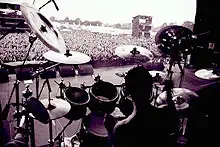
At this stage, are there any concrete touring plans for when the album sees the light of day?
Mark: At the moment it is all about the right opportunity at the right time as everyone has commitments. Having said that, we are all gunning to take COG out live. It feels a little like a powder keg waiting to go off!
Simon: Yes, we're all ready to get out again, I think. I wouldn't be surprised if there are a few naked stupidity incidents occurring very early in 2006.
Mark: Brutally heavy in parts, brutally beautiful in parts and stripped down to basics to concentrate on songs instead of effects.
Simon: Just good, heavy, musically interesting songs.
More results...


